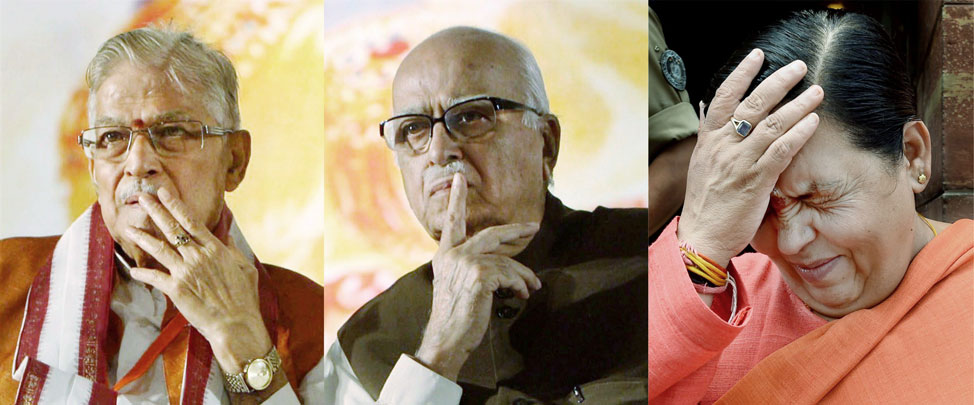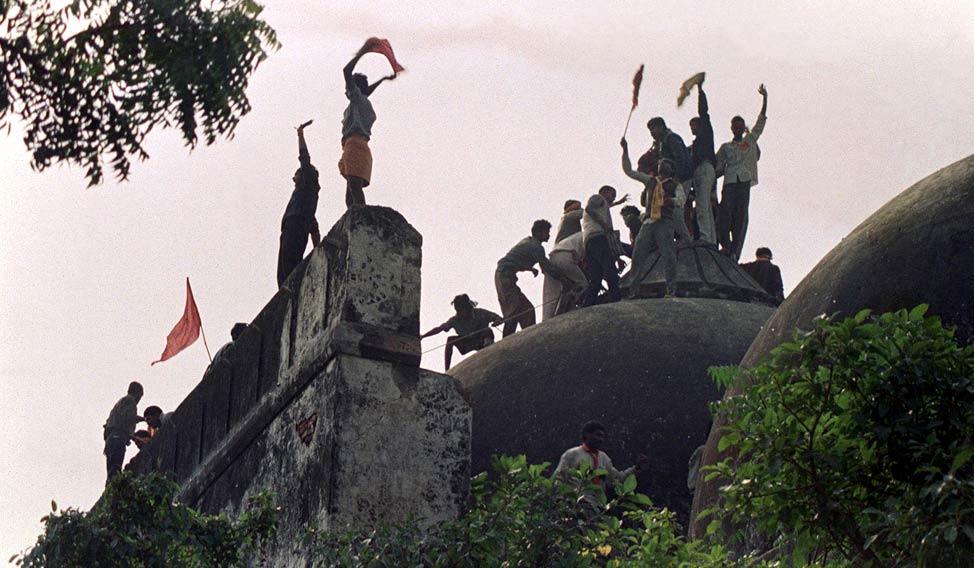Even after a quarter of a century, an amicable solution to the Babri Masjid-Ram Mandir issue seems to be just a mirage. With the BJP's emphatic win in Uttar Pradesh, the right-wing groups would have though that it is only a matter of time before the Ram Mandir comes up at the disputed site in Ayodhya, but the issue shows no sign of dying down.
A special CBI court today charged BJP leaders L.K. Advani and Murli Manohar Joshi, Union Minister Uma Bharti, and nine others with criminal conspiracy in the 1992 Babri Masjid demolition case. The court also dismissed the discharge plea filed by the BJP leaders. All the accused were earlier given bail on a personal bond of Rs 50,000 each.
While the court will be hearing the matter on Wednesday, here's a quick look at the timeline of events in the controversial Babri Masjid-Ram Mandir issue:
1528: Mughal ruler Babar's general Mir Baqi constructs a mosque, allegedly demolishing a temple marking Lord Ram's birthplace.
1853: The first recorded communal violence occurs in Ayodhya.
1855: Communal clash occurs at the site following claims by Sunni leaders that the Hanumangarhi area occupied by the Ramabhakta sect near the mosque was built on the remains of a mosque. Another clash takes place, and the Nawab of Avadh seeks help from the English East India Company to suppress the disturbance.
1857: A priest of the Hanumangarhi temple constructs 'chabutra' (platform), setting the stage for the current dispute.
1859: British administration erects a fence to separate the places of worship, allowing the inner court to be used by the Muslims and the outer court by the Hindus.
1949: Idols of Lord Ram and Sita appear inside the mosque. Muslims protest. Both Muslims and Hindus file civil suits. Centre proclaims the premises a disputed area and locks the gates.
1950: Hindu Mahasabha member Gopal Singh Visharad files the first title suit seeking injunction to worship at the site. Ramachandra Das Paramahans also files suit but withdraws it.
1959: Nirmohi Akhara files the third suit, seeking ownership of the disputed site.
1961: Sunni Wakf Board files the fourth suit for possession of the site.
1984: Communal tensions spread across the country with the VHP forming a committee to liberate the disputed site and build a temple there. BJP leader L.K. Advani assumes leadership of the campaign.
1986: Faizabad district judge orders the gates of the disputed area to be opened, allowing Hindus to worship in the precincts. Muslims set up Babri Masjid Action committee.
1989: VHP steps up campaign to construct the temple and lays the foundation stone on the land near the mosque.
1990: VHP activists partly damage the mosque. Advani starts a rath yatra from Somnath on September 25 in support of the construction of the temple. Advani's rath stopped, and he is arrested at Samastipur in Bihar, in October.
1992: Activists of VHP, Shiv Sena and BJP demolish the mosque on December 6, sparking communal riots across the country; nearly 2,000 people killed in violence.
 (From left) Murli Manohar Joshi, L.K. Advani and Uma Bharti
(From left) Murli Manohar Joshi, L.K. Advani and Uma Bharti
2002: VHP confirms deadline of March 15 to begin temple construction, attracting hundreds of volunteers to Ayodhya. At least 60 of them die in a fire on a train in Godhra on February 27. Nearly 2,000, mostly Muslims, killed in Gujarat in March following the Godhra carnage. In April, three High Court judges commence hearing for determining the ownership of the disputed site.
2003: A court-ordered survey by archaeologists points to evidence of a temple existing beneath the mosque. A Rae Bareli court rules that seven Hindu leaders should stand trial for the demolition of the mosque. No charges brought against Advani.
November: Allahabad HC rules that the earlier order exonerating Advani for his role in the demolition should be reviewed.
2005: Suspected Islamic militants attack the disputed site using a jeep laden with explosives. Security forces kill five militants.
2007: Fifteen persons, who were accused of burning nine persons alive in the communal riots following the demolition of the mosque, sentenced to life by a local court.
2009: Liberhan commission, set up in 1992 to inquire into the conspiracy behind the demolition, submits its report after 48 extensions.
2010: Allahabad HC in July asks parties to reach a compromise before the final verdict. Lucknow bench of the HC says it will pronounce judgement on September 24.
September 24: HC verdict on the title suit case deferred.
September 28: SC rejects petition to defer the HC verdict.
September 30: Allahabad HC dismisses title suits of Sunni Wakf Board and Nirmohi Akhara. The land to be divided among three parties: Hindu Mahasabha, Sunni Wakf Board and Nirmohi Akhara. Disputed land under the central dome is Ramjanmabhoomi.
December 2010: The Akhil Bharatiya Hindu Mahasabha and the Sunni Waqf Board challenge the verdict in the Supreme Court.
May 2011: The Supreme Court suspends the Allahabad HC ruling.
2015: The VHP announces a nationwide drive to collect stones for the construction of the temple. Six months later, in December, two stone-laden trucks arrive at the disputed site. Mahant Nritya Gopal Das claims Modi government has given the nod to build the temple. Uttar Pradesh Chief Minister Akhilesh Yadav says he will not allow the arrival of the stones in Ayodhya.
March 6, 2017: The Supreme Court says charges against Advani and other BJP leaders in the 1992 Babri Masjid demolition case cannot be dropped and that the case may be revived.
March 21: The Supreme Court says the matter is sensitive and should be settled out of court. It asks stakeholders to find an amicable solution through talks.
April 19: The Supreme Court allows CBI's appeal in Babri Masjid demolition case and restores criminal conspiracy charge against Advani and other BJP leaders.




